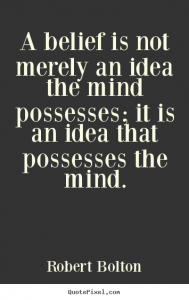Transforming School Professional Cultures: Change and Belief
- On 13-03-2015
 How much change has been occurring in your school of late? What is your experience of the change?
How much change has been occurring in your school of late? What is your experience of the change?
If we asked those questions of teachers in your school what do you think their responses might indicate? Would they respond in a joyful and empowered way or perhaps respond “yep yet another change”? I suspect for many teachers and leaders in schools there always seem to be some change initiative or another going on. Education appears to be undergoing a period of constant change, as it has for many years, and I don’t believe that this is going to be different for many years yet to come.
Given the constant changes occurring in our schools – whether they are driven by political, curriculum or pedagogical drivers – it is surprising to me that we consistently find that one of the biggest areas that schools seem to struggle with is managing the change that is occurring. Most school reforms or change initiatives fail because we don’t examine the underlying context or beliefs that exist within a school.
Let me give you some examples from our experience:
- A school has experienced a high turnover of senior leadership members in the past five years and have experienced “micromanagement from above”. The staff teachers indicate they have “change fatigue” and have little faith or trust in leadership at this point. Embedding new initiatives to improve student learning outcomes has been extraordinarily slow.
- A school has recently changed its senior leadership after a long period of stability and the new team wants to bring in a raft of much needed curricula and pedagogical change given the significant drop in student numbers at the school. However, there is a lot of “baggage” and resistance due to the “wrongs of the past”. Unless staff members have the opportunity to address and complete past issues again change will be slow.
- A school has a large number of teachers who have been at the school, and only that school, for decades. Whilst many of them are good to excellent teachers they aren’t necessarily interested in changing the way they teach or assess.
I could go on with a variety of examples but my point is that each and every school has individual challenges that need to be addressed to empower and enable positive change to occur. Some schools occur as fortresses against change, others are beginning to take down their walls, and others are flowing rivers where change has teachers meander from one initiative to the next and nothing gets embedded.
There is a wonderful old Sufi tale that tells of a man whose neighbors come upon him on his hands and knees under a street lamp. The man explains that he is searching for his lost keys. The neighbors immediately join in the search, but without success. When they ask the man if he’s sure this is where he lost the keys, he replies, “No. I lost them outside my door—but there’s more light here!”
Schools need to stop looking where the light is and start strategically searching in the most likely areas. They must uncover the invisible actors at play within a school – whether they are school structures, policies, past practices, teacher beliefs, parental beliefs, student beliefs, etc. What are the causes of the way things are? What are the teacher beliefs about their students? What are the parental beliefs about their children? What are the staff beliefs about leadership? The more a school makes visible the underlying beliefs and context the more it can actually enact change appropriately within the school.
Case in point, Judith Lloyd Yeo in her book “Teaching in Mind: How Teacher Thinking Shapes Education” pointed out the following specifically about teacher beliefs:
- Teacher’s beliefs profoundly influence their understanding of attempted reforms
- The same words or phrases might signal quite different things to different teachers
- Each teacher operates from a set of unexamined beliefs about the nature of teaching and learning, about knowledge, and about the purpose of education itself.
- Teachers base their thinking and behaviour on unconscious values – personal, professional and those of the culture in which they live and were raised. Often personal values conflict with values of the school, school leadership, and even with a teacher’s own values regarding students.
- Some practices never take root or cannot be sustained because the underlying beliefs have not changed.
For those of you who have worked with us before this is why we often start our professional learning workshops with inquiries that unpack teacher beliefs and habits. If you are interested in further reading here are some great articles for you to explore!
Cultivating Teachers’ Beliefs, Knowledge and Skills for Leading Change in Schools
How Teacher Thinking Shapes Education
Teaching Practices, Teachers’ Beliefs and Attitudes
The Beliefs-Behavior Connection: Leading Teachers Toward Change
Leading Change – Why Transformation Efforts Fail
[Tweet “Beliefs and Contexts – why school change efforts fail”]

0 Comments